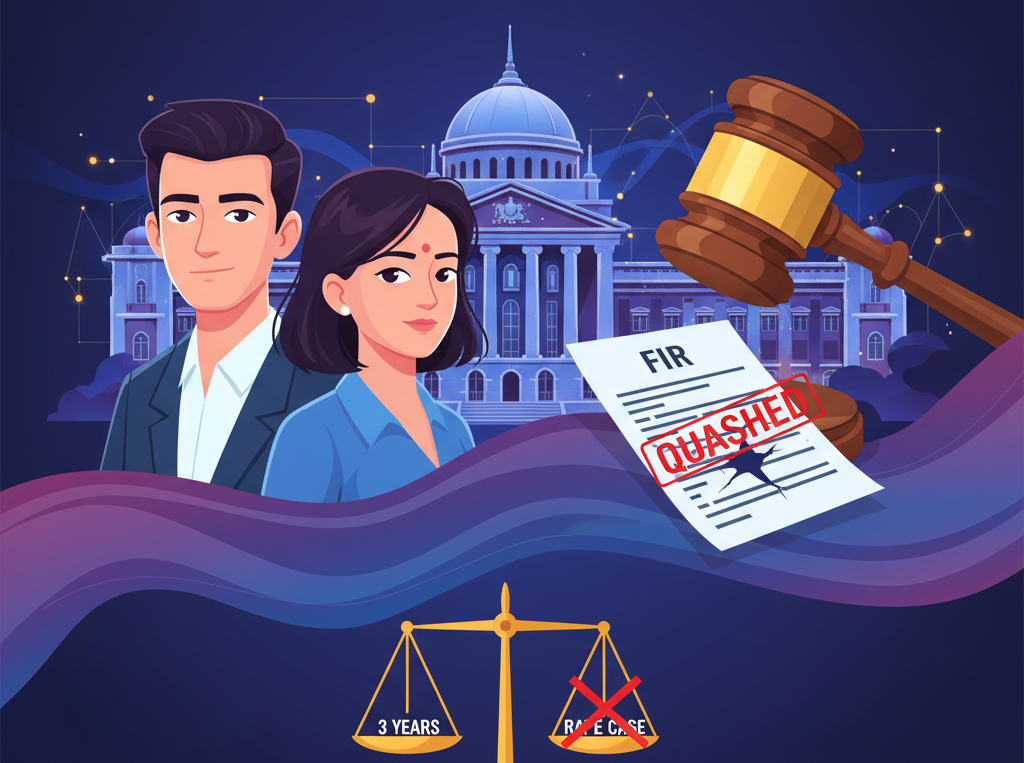Bombay High Court quashes rape and SC/ST Act case, ruling that a 3-year sexual relationship between two adults was consensual and not based on a ‘false promise to marry,’ emphasizing the distinction between a breach of promise and a misconception of fact.
The Nagpur Bench of the Bombay High Court recently delivered a significant ruling by quashing an FIR and a subsequent charge sheet against a 27-year-old man accused of rape and offenses under the Scheduled Castes and the Scheduled Tribes (Prevention of Atrocities) Act, 1989. The core of the court’s decision hinged on the nature of consent in a prolonged relationship between two mature adults, ultimately concluding that the sexual activities were consensual and not vitiated by a “misconception of fact” or a false promise to marry.
The Case Background: A Love Story Turned Legal Dispute
The dispute arose from an FIR lodged by the complainant against the applicant following the applicant’s engagement to another woman. The two adults had been in a romantic and sexual relationship spanning over three years, from August 2017 to November 2020. The complainant alleged that the applicant maintained physical relations with her under the pretext of marrying her, and that this promise was false. The moment she learned of his engagement, the dispute escalated, leading to the FIR, which included charges under Section 376(2)(n) of the IPC (Repeated rape on the same woman) and provisions of the SC/ST Act.
Advocate S.S. Shingane, representing the applicant, stressed that both parties were adults (the complainant being 35, and the applicant 27 at the time of the FIR) who engaged in a “voluntarily sexual relationship out of their own consent and free will.” He contended that the allegations, even if taken at face value, did not legally constitute the offense of rape.
Court’s Analysis: Duration Implies Freewill
The matter was heard by a Division Bench led by Justice Urmila Joshi-Phalke and Justice Nandesh S. Deshpande, who carefully scrutinized the facts and the legal precedent. A major factor in their analysis was the duration and continuity of the relationship.
The Court observed:
“Looking at the ages of the parties, and looking at the length for which relationship continued i.e. for more than three years, it can safely be inferred that parties engaged themselves into sexual relationship out of their own consent and free will and without any promise of marriage.”
The Bench noted that the parties were “sane enough to understand the repercussions of engaging and continuing any relationship.” The fact that the FIR was lodged only after the man’s engagement to another person was a crucial indicator that the relationship had gone sour, rather than being tainted by a fraudulent promise from the start.
The Critical Legal Distinction: Breach vs. False Promise
The High Court heavily relied on the distinction established by the Supreme Court of India in the case of Pramod Suryabhan Pawar Vs. State of Maharashtra (2019). This legal principle is vital in cases alleging rape based on a promise to marry:
- False Promise (Vitiates Consent): This is where the man makes a promise to marry at the inception of the relationship with the intention of breaking it. The woman’s consent is based on a “misconception of fact” (as defined under Section 90 IPC), rendering the sexual act non-consensual and amounting to rape.
- Breach of Promise (Does Not Vitiate Consent): This occurs when the promise to marry was made in good faith but is later broken due to intervening circumstances, incompatibility, or a change of mind. In such a scenario, the consent given for the sexual act remains valid, and the act does not constitute rape.
The Bombay High Court concluded that there was no material to suggest the applicant “never intended to marry” the complainant at the initiation of the relationship. Thus, the situation was deemed a mere breach of promise, not a false promise that could vitiate the complainant’s consent.
Abuse of Process and The Quashing of Proceedings
Citing the guidelines from the landmark Supreme Court case of State of Haryana and others Vs. Bhajanlal and others (1992), the Bench held that allowing the prosecution to continue would result in a “miscarriage of justice” and an abuse of the process of the Court.
Consequently, the Court allowed the application, quashing the FIR and the subsequent charge sheet. This ruling reaffirms the principle that in cases involving mature adults and prolonged, voluntary sexual activity, a subsequent failure to uphold a promise to marry does not automatically convert the relationship into an act of rape.
Frequently Asked Questions (FAQ)
What is the difference between a “False Promise” and a “Breach of Promise” in a rape case?
A False Promise is a promise to marry made without any intention of keeping it, used solely to gain consent for sexual intercourse. This is legally considered a “misconception of fact” that vitiates consent and constitutes rape. A Breach of Promise is when a promise to marry is made in good faith but later broken due to various circumstances (like a change of heart, family pressure, etc.). In the latter case, the consent for sexual relations remains valid, and it is not considered rape.
Why was the duration of the relationship (3 years) a key factor?
The three-year duration suggested to the Court that the sexual relationship was a continuing, voluntary choice by both parties, rather than a single act whose consent was extracted immediately under a false promise. The longevity indicated “freewill” and a knowing choice by the adults involved.
Does this ruling mean every broken marriage promise cannot lead to a rape case?
No. This ruling reinforces that a broken promise to marry is not automatically rape. The prosecution must still prove, beyond a reasonable doubt, that the man made the promise with the fraudulent intention of never marrying the woman, right from the beginning, to gain sexual access. Where the promise was initially genuine, as the Bombay HC inferred here, it is a breach of contract/trust, not a criminal offense of rape.

























